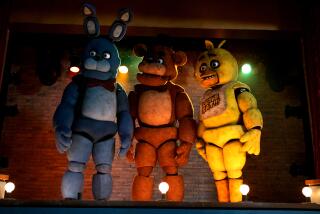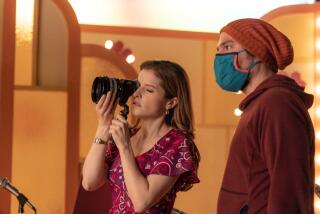Back to the sawing board
- Share via
If you are in the market for unspeakable horror but wouldn’t be caught dead slinking into “Saw IV,” Michael Haneke is definitely the go-to guy for you. “Funny Games,” his latest postmodern smackdown, is about a happy middle-class couple and their young son whose summer cottage is invaded by a pair of psychos. The night I saw the film, the audience had a look of expectant dread as the house lights lowered. The look said, “Are you tough enough to take it?”
“Funny Games” is actually a shot-for-shot remake of Haneke’s 1997 German-language original, a movie I thought I had seen the last of. But like a recurring plague, “Funny Games” is baaack -- in English this time, and starring Naomi Watts and Tim Roth. It takes a special arrogance to remake one’s own movie frame by frame. Was the original so perfect?
Haneke has stated that he redid “Funny Games” to make it more accessible to Americans as a reaction to Hollywood movie violence and the way “American cinema toys with human beings.” Look who’s talking. When it comes to toying with audiences (or gullible cineastes), Haneke is peerless. All directors, of course, manipulate their viewers, but few are as fetishistic about it as Haneke. Every sequence, every shot in “Funny Games” is another coil in his mousetrap.
Ann (Watts), George (Roth) and Georgie (Devon Gearhart) are introduced as a model middle-class family. They have a blissful sunniness. Then two blondish young men in shorts and matching white shirts, one calling himself Paul (Michael Pitt), the other Peter (Brady Corbet), insinuate themselves into the lakefront cottage and proceed to methodically maim and torture everybody.
Why? When George, writhing in pain, pops the question, Paul replies, “Why not?” Haneke is not a big one for answers. (In “Cache,” his highly touted art-house creepfest, we never really find out who sent that bookish bourgeois couple all those tapes and nasty drawings.) Haneke systematically dismantles any psychosocial explanations for the boys’ blood lust. Paul offers up for the family a checklist of convenient interpretations -- all lies: Peter is white trash, gay, a drug addict, a criminal, incestuous, his father was an alcoholic. My favorite of Paul’s fibs: “He’s jaded and disgusted by the emptiness of existence.”
In a generous mood, one could argue that Haneke is going for a truer portrait of violence by relinquishing the usual freaky Freudian, society-made-me-do-it baggage. But his solution is also a cop-out. He is saying that the causes of violence, at bottom, are not only unknowable but not worth knowing.
If the mayhem in “Funny Games” is so true-to-life, why doesn’t Haneke infuse his killers with the same human understanding that he provides their victims? Watts and Roth, after all, are certainly encouraged to make us feel their characters’ pain, and the little boy’s fright is traumatizing.
The answer, I think, is that Haneke sees Peter and Paul as both less and more than human. Either way, they’re unreal -- monstrous symbols of, yes, “the emptiness of existence.” They are as depraved as Freddy Krueger, with better hair and with somewhat better manners. (Maybe in the third go-round, Haneke can pit his Manichaean Beavis and Butt-head against Javier Bardem’s Anton Chigurh. I’d pay to see that.)
Despite Haneke’s high-toned talk in interviews about deconstructing violence in “Funny Games,” or about how the media has desensitized us from “reality,” what really gets his goat is the bourgeoise. In his view, their love of art, opera and books, their taste for golf and fine wine, has insulated them from their basest and most authentic selves. In film after film, Haneke flays the middle class without ever actually acknowledging that he is doing so. The worst violence in his new movie is mostly off camera, but the humiliations Ann and George undergo are luridly exposed. These people must suffer for their comforts.
Haneke is undeniably gifted but he’s also a scourge who plays both sides of the ideological fence. He covets the dignity of Ann and George while merrily obliterating them. He implicates us as voyeurs -- accomplices -- in his bloody postmodern prank; at the same time, he has no qualms about parading Watts in her bra and panties. No doubt some will see her get-up as totemic or anomic or whatever.
In the end, the difference between “Funny Games” and Hollywood schlock horror may only be a matter of breeding. “Funny Games” is “Saw IV” with a PhD.
--
“Funny Games.” MPAA rating: R for terror, violence and some language. Running time: 1 hour, 52 minutes. In limited release.
More to Read
Only good movies
Get the Indie Focus newsletter, Mark Olsen's weekly guide to the world of cinema.
You may occasionally receive promotional content from the Los Angeles Times.










